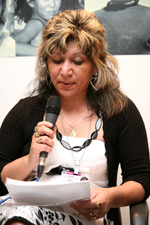Featured Update
The Story of Elena Gorolová

Elena Gorolova highlights the plight of Roma women, during a UN Human Rights side event of the Durban Review Conference titled:Voices. © UN Photo/ Patrick Bertschmann
Elena Gorolová and her husband had always dreamed of having a little girl. Blessed with the birth of two sons, they looked forward to the next – until she was told she had been sterilized without her knowledge by the very doctor who delivered her son.
The horrifying discovery led to the slow realization that she was not alone, and that many Roma women like herself had been involuntarily sterilized in hospitals in the Czech Republic. Pleas to officials not only fell on deaf ears, but added insult to injury.
"My husband and I visited the social services department to demand an explanation and asked if this had happened because we are Romani and the staff were extremely rude to us and threw us out" Gorolová told a gathering at the United Nations in Geneva, on the sidelines of the Durban Review Conference.
Gorolová recalls that the birth of her second child in a hospital in Ostrava in 1990 was a difficult one.
"I was in labour, it was very confusing and there were many doctors all around me," she said. "A nurse came to me with a paper and I signed it. At the time I had no idea what that meant as I was in great pain."
"The next day, the head physician of the maternity ward told me I would never be able to have children again. I began to cry. I was only 21 years old and we wanted to have a little girl. My husband began to cause a scene and for a long time he could not bear the thought that we could not have more children."
Gorolová went on to discover that her Fallopian tubes had been severed, making the operation irreversible.
"The nurse told me that previously the method had been to tie the tubes, but that some women had become pregnant despite this," she said. "They didn’t want any more Roma children to be born...I have experienced discrimination since I was a child...they just don’t like the Roma people. "
It was a long time before Gorolová could truly come to terms with what she had been subjected to. The recovery process began when a number of organizations, the League of Human Rights, the European Roma Rights Centre, and Life Together, held a meeting for women whose health and lives had been affected by forced sterilization. Speaking openly to women who understood what she had been through gave Gorolová the catharsis and courage she needed to move forward.
"Our claims were investigated by the Czech ombudsman, who reviewed complaints from more than 80 women. We then created a group focused on involuntary sterilization and met regularly at Life Together."
The group set out to promote the concept of informed consent, promote patients’ rights, raise awareness about forced sterilization, seek compensation and a Government apology for its failure to protect them. They also sought to improve the way medical staff treated women in maternity wards.
The women held photo exhibitions and demonstrations across Europe and bore testimony before the Committee on the Elimination of Discrimination Against Women (CEDAW) at the United Nations. A gynaecologist joined efforts to educate Romani women and girls about their health and a psychologist provides counseling to victims.
It was not easy being in the public eye.
"After our demonstrations, the women had to deal with many local papers writing untrue articles about them," she said. "On how they were perceived by neighbours, alleging that they owed money, or did not pay rent, or comparing the difference between the states of mind of Romani and non-Romani women when consenting to sterilization."
But the changes they have won have been rewarding. The term "informed consent" is now a part of the vocabulary at hospitals and more women have been coming forward to share their experiences.
"Since July of 2008, we have located 20 more previously unreported cases, including a woman from Frýdek–Místek to whom this happened in 2007; her social worker threatened to take her children away and place them in state care unless she underwent sterilization," Gorolová said.
Through her work at Life Together, Gorolová, who is also a civil society member of the Czech Government Council for Roma Community Affairs, strives to create friendly platforms for communication between Roma and non-Roma in Ostrav, and to improve the living conditions of families in need.
The group has recently launched a project entitled "You Are Not Alone" to identify cases of illegal sterilization, empower victims to seek justice, to reach out to young Roma women and girls, as well as healthcare professionals on the issues. They are also advocating for the implementation of the recommendations of the Czech Ombudsman, CEDAW and the Committee on the Elimination of Racial Discrimination (CERD).
"Giving birth is one of the most beautiful experiences in the world but many Roma women have been deprived of this. For them, involuntary sterilisation has resulted in negative health effects and even divorce. We have to ensure this does not happen to other women and must continue the fight."
Top